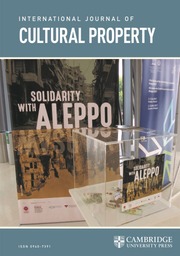Article contents
Aboriginal rights to cultural property in Canada
Published online by Cambridge University Press: 18 February 2005
Extract
This article explores the rights of Aboriginal peoples in Canada concerning movable Aboriginal cultural property. Although the Canadian constitution protects Aboriginal rights, the content of this protection has only recently begun to be explored by the Supreme Court of Canada in a series of important cases. This article sets out the existing Aboriginal rights regime in Canada and assesses its likely application to claims for the return of Aboriginal cultural property. Canadian governments have shown little interest in attempting to resolve questions concerning ownership and possession of Aboriginal cultural property, and there have been few instances of litigation. Over the last decade a number of Canadian museums have entered into voluntary agreements to return cultural objects to Aboriginal peoples' representatives. Those agreements have often involved ongoing partnerships between Aboriginal peoples and museums concerning such matters as museum management and exhibition curatorship. A recent development has been the resolution of specific repatriation requests as part of modern land claims agreements. The compromise represented by these negotiated solutions also characterizes the legal standards being developed to reconcile existing Aboriginal rights and the legitimate policy concerns of the wider Canadian society.
- Type
- Research Article
- Information
- Copyright
- © The International Cultural Property Society
- 5
- Cited by


